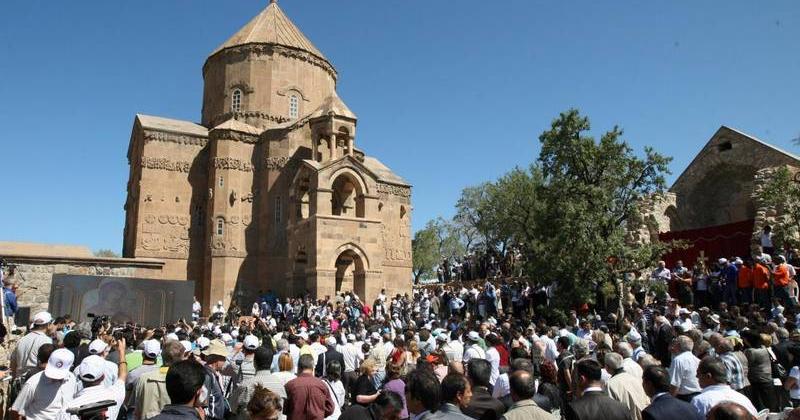The unofficial announcement was given on Sunday 17th of August in Buenos Aires by Cardinal Mario Poli, the successor of Jorge Mario Bergoglio as archbishop of the Argentinean capital. The Pope will celebrate Mass to remember the victims of the Armenian genocide on the 12th of April 2015, its 100th anniversary. Cardinal Poli announced this in the church of Our Lady of Narek, the Armenian Catholic Cathedral in Buenos Aires. “The Holy Father has accepted the invitation of the Armenian Catholic Church”, added the parish priest Father Pablo Hakimian, recalling that Francis had spoken about the tragedy, deemed the first in a series of genocides in the 20th century, with the Patriarch of Cilicia Nerses Bedros XIX last year.
The news was given at first by blogs and media linked with the Armenian community, the blog “il Sismografo” meaningfully reported the news, it was then picked up in these pages too.
In 1915, during the First World War, one and a half million Armenians were killed in the Ottoman Empire; the vastness of this operation of ethnic cleansing and its methodological execution indicated a project of annihilation for the whole Armenian population in Anatolia. Pope Benedict XV publicly and directly intervened with a letter to the sultan Mohammed V on the 10th of September 1915, highlighting the seriousness of the massacres and asking, in vain, for an intervention in defence of Armenian people. A hundred years from then, this chapter in history remains controversial. In 2005, the Turkish prime minister Erdogan invited historians to reconsider the “events of 1915” using all archives, but his openness had no following. The Turkish authorities downsized the extent of the massacres – they recognise between 300,000 and 500,000 victims – and do not wish for the word “genocide” to be used, as well as protesting against those who do use it. This is despite the official recognition of the Armenian genocide by 21 States. Among international organizations, the UN War Crimes Commission, the European Parliament and the World Council of Churches, recognise the genocide as well.
As Archbishop of Buenos Aires, Jorge Mario Bergoglio always maintained a close relationship with the Armenian community. On the 22nd of April 2006, on the occasion of the 91st anniversary of the genocide, he invited Turkey to acknowledge that serious crime. And in 2011, answering the question of the descendant of a survivor, he described the genocide as a “heinous crime”. At the beginning of 2013, receiving a delegation headed by Nerses Bedros XIX Tarmouni, the Armenian Patriarch of Cilicia, when one of the attendees claimed to be the descendant of a survivor, Pope Francis said that “the Armenian genocide was the first in the 20th century”. It was an informal meeting, but the words of the Bishop of Rome, reported by those who were present, caused a reaction from the Turkish government in Ankara that displayed its disappointment through diplomacy.
Pope Francis’ words are in line with the positions of his immediate predecessors. On the 9th of November 2000, Pope John Paul II and the Catholicos of Armenians Karekin II signed a “joint statement” in Rome that explicitly referred to the genocide: “the Armenian genocide, which began the century, was a prologue to horrors that would follow”.
The initiative caused a harsh diplomatic reaction from Turkey. The following year, in September 2001, during his trip to Armenia, Pope John Paul II avoided using the word “genocide” directly in his speeches, but used the expression “Metz Yeghérn” – “Great Evil” – in a prayer. This expression is used by the Armenian population itself to describe the genocide. At the end of his visit to Armenia, John Paul II and the Catholicos signed a new “joint statement”, in which this expression was used: “The extermination of one and a half million of Armenian Christians, in what is generally referred to as the first genocide of the twentieth century.”
On the 20th of March 2006, when Benedict XVI received the Armenian Patriarch of Cilicia, together with members of the Patriarchal Armenian Synod, he did not use the word “genocide” in his public speech, but talked about a “terrible persecution that is written in history with the sadly evocative name of metz yeghèrn, the great evil”.
The anniversary and the celebration announced by Cardinal Poli are still months away, and have no official confirmation as of now. In prospect of Francis’ possible trip to Armenia, the Mass of intercession for the victims of that genocide on its 100th anniversary – beyond historical debates around the size of the massacre and possible political exploitations – is a pastoral gesture that recalls the prayer pronounced by John Paul II on the 26th of September 2001 at the Tzitzernakaberd Memorial in Yerevan, where the victims exterminated in 1915 are commemorated.
